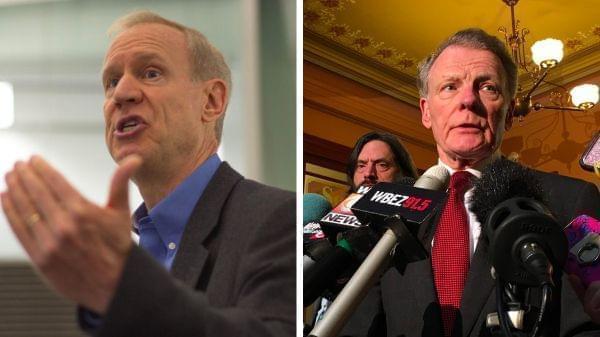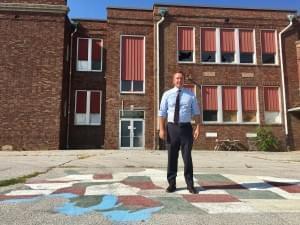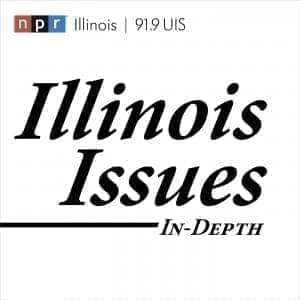Illinois Issues: Stories Of The Year

The Illinois General Assembly, led by House Speaker Mike Madigan (right) and Senate Pres. John Cullerton, overrode Gov. Bruce Rauner's (left) veto of three budget bills to end the impasse that dragged on for more than two years. Brian Mackey/NPR Illinois
Days into what would have been Illinois' third fiscal year without a budget, lawmakers took three votes that momentarily broke the gridlock between Democratic legislative leaders and the first-term Republican governor.
Some Republicans bucked their party to override Gov. Bruce Rauner's vetoes of a $36 billion spending plan and accompanying income tax hike.
Ending the budget impasse wasn't the only agreement reached this year. Lawmakers overhauled the school funding formula and agreed to allow the state to pay for abortions under Medicaid and state health insurance plans.
Meanwhile, the 2018 gubernatorial race, as well as other key contests, kicked off across the state.
Daisy Contreras asked two fiscal experts about the state's long-awaited budget, specifically, if the tax increase was necessary and what more needed to be done to get Illinois' finances in order.

The Illinois General Assembly narrowly overrode Gov. Bruce Rauner's vetoes of a set of budget bills in July, giving Illinois its first state spending plan in more than two years.
Contreras also looked into why the Prairie State competes with New Jersey for the worst fiscal situation in the nation. The two states are struggling with similar issues – unfunded pension obligations, expenses that outpace revenue and trouble passing a budget year after year. But some analysts suggest California could be an example of how to turn around the situation around.
Meanwhile, social service agencies, healthcare organizations and colleges and universities continue to struggle with the fallout of two years without steady state funding. In November, Dean Olsen chronicled how hospitals and those insured by the state are coping with the lingering effects of the budget impasse.
With conflicting analyses from the governor's office, legislators and others, columnist Charlie Wheeler examined if the budget is actually balanced. Despite Rauner blasting Democrats for passing a budget he estimated was some $1.7 billion out-of-whack, Wheeler points out an analysis from his office calculates an end-of-year surplus of $2.2 billion. Still, come next fiscal year, the state will face a deficit of $1.5 billion.
The 2018 primaries are just around the corner, and Wheeler recently explored Rauner's re-election prospects.

State Sen. Andy Manar, a Bunker Hill Democrat, stands in front of Meissner Elementary. He often used the school as an example of why the state needed education funding reform.
Poorer schools could see more money next year under the new funding formula. Education Desk Reporter Dusty Rhodes traces the years of work it took to achieve funding reform in a profile of reform champion state Sen. Andy Manar.
After reversing his stance, Rauner signed legislation to allow the state to fund abortions through Medicaid and state insurance plans, angering his conservative supporters. Months before the decision, Robert Loerzel laid out the debate.
Meanwhile, issues that caught national attention sparked debate in Illinois. The Southern Poverty Law Center found that hate incidents rose after the 2016 presidential election. Maureen McKinney looked into state officials' responses, including new legislation on hate crimes.
Early this year, Rachel Otwell took a look at the historic battle around the Equal Rights Act in Illinois, which bans discrimination based on sex. An effort in the early 1980s to approve the ERA failed in the state. But women's rights activists renewed their push this year.

Illinois Issues is in-depth reporting and analysis that takes you beyond the headlines to provide a deeper understanding of our state. Illinois Issues is produced by NPR Illinois in Springfield.
Links
- Illinois Issues: Illinois Women Tell Their #Metoo Stories
- Illinois Issues: New School Discipline Philosophy One Year Later
- Illinois Issues: Campaign 2018 - Rauner Vs. Madigan
- Illinois Issues: Third Party Candidates Want Rules Eased To Get On Ballot
- Illinois Issues: Legislative Checklist - Veto Session
- Illinois Issues: Is The State Budget Balanced?
- Illinois Issues: Cities Lose Out On Retail Tax As Online Shopping Booms
- Illinois Issues: Land of Lincoln, New Jersey Compete For Worst Fiscal Condition
- Illinois Issues: Worry About DACA’s Fate Triggers Anxiety, Depression In Immigrants
- Illinois Issues: Coming Up In The Veto Session

